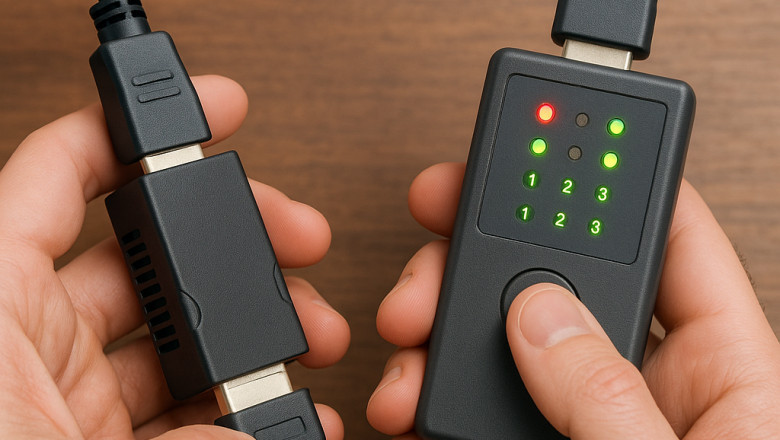views
Does Length of HDMI Cable Affect Signal?
HDMI cables help us enjoy movies, games, and shows in high quality. But sometimes, you might wonder if using a long HDMI cable could make your picture or sound worse. Let’s explore what really happens when your HDMI cable gets longer and how to make sure you always get the best signal.
What is an HDMI Cable?
An HDMI cable is a special wire that sends both video and sound from one device to another. You use HDMI cables to connect your TV, computer, game console, or streaming box. The best 4K HDMI cable can carry lots of data, so you get sharp images and clear sound.
The Exact Answer: Does Length of HDMI Cable Affect Signal?
Yes, the length of an HDMI cable does affect the signal. As the cable gets longer, the signal can get weaker. This can cause blurry pictures, flickering, sound dropouts, or even a blank screen. For most setups, keeping your HDMI cable under 50 feet (15 meters) helps prevent these problems. For high resolutions like 4K, it’s best to use a cable under 10 feet (3 meters) for the clearest picture.
Why Does Cable Length Matter?
When an HDMI signal travels through a cable, it faces resistance. The longer the cable, the more resistance it meets. This weakens the signal, a problem called attenuation. Over long distances, the signal might not be strong enough to reach your TV or monitor with full quality.
What Problems Can Happen with Long HDMI Cables?
If your HDMI cable is too long, you might notice:
-
Blurry or fuzzy pictures
-
Flickering or flashing screens
-
Sound that cuts in and out
-
Strange colors or lines
-
Sometimes, no picture or sound at all
These problems are more likely if you use a regular HDMI cable for a very long distance.
How Long is Too Long for an HDMI Cable?
Most standard HDMI cables work well up to about 50 feet (15 meters). If you need a longer cable, you might start to see problems. For the best 4K HDMI cable performance, try to keep the length under 10 feet (3 meters). If you need a longer cable, look for “active” HDMI cables or use a signal booster to help the signal travel farther.
What Else Can Affect Signal Quality?
Besides length, other things can make your HDMI signal weaker:
-
Low-quality cables: Cheap cables might not have good shielding or thick wires, so the signal fades faster.
-
Electromagnetic interference: Other electronics like Wi-Fi routers or microwaves can mess with the HDMI signal, especially over long cables.
-
High resolution: Sending 4K or 8K video needs more data, so the signal can fade faster over long cables.
-
Sharp bends or twists: Bending the cable too much can damage the wires inside and weaken the signal.
How to Get the Best Signal from Your HDMI Cable
-
Use the shortest cable you can for your setup.
-
Choose the best 4K HDMI cable for high-resolution TVs and monitors.
-
Avoid running HDMI cables next to power cords or other electronics.
-
Don’t bend or twist your HDMI cable too much.
-
If you need a long cable, use an active HDMI cable or a signal booster.
What is an Active HDMI Cable?
An active HDMI cable has a small chip inside that helps boost the signal over long distances. These cables are great if you need to run your HDMI cable farther than 50 feet. They help keep the picture and sound clear, even for 4K video.
Can You Use HDMI Extenders?
Yes! HDMI extenders let you send the signal over even longer distances, sometimes using network cables instead of regular HDMI cables. This is helpful for big rooms, classrooms, or home theaters where the devices are far apart.
How to Choose the Best 4K HDMI Cable
When shopping for an HDMI cable, look for:
-
High-speed or ultra high-speed rating (for 4K and 8K video)
-
Thick, sturdy build that won’t break easily
-
Good shielding to block out interference
-
The right length for your setup (shorter is better for the best quality)
You don’t need the most expensive cable, but avoid very cheap ones for long runs or high resolutions.
Tips for Keeping Your HDMI Cables Working Well
-
Replace old or damaged cables right away
-
Label your cables so you know which one goes where
-
Keep cables away from heat and water
-
Test your setup after connecting to make sure the picture and sound are clear
Final Thoughts
The length of your HDMI cable really does affect the signal. Longer cables can cause signal loss, blurry pictures, and sound problems—especially for 4K and higher resolutions. By using the best 4K HDMI cable, keeping your cables short, and avoiding interference, you can enjoy crisp, clear entertainment every time! If you need to go a long distance, try an active HDMI cable or a signal booster for the best results.
Sources: https://www.techonent.com/2025/06/how-to-troubleshoot-hdmi-extension-cable-issues.html













![¿Cómo puedo contactar con una persona en vivo en los vuelos de Frontier? [Guía paso a paso]](https://timessquarereporter.com/public/upload/media/posts/2025-06/12/como-puedo-contactar-con-una-persona-en-vivo-en-los-vuelos-de-frontier-guia-paso-a-paso_1749705127-s.jpg)


![How Do I Get to a Live Person at Frontier Flights? [Step-by-Step Guide]](https://timessquarereporter.com/public/upload/media/posts/2025-06/12/how-do-i-get-to-a-live-person-at-frontier-flights-step-by-step-guide_1749705004-s.jpg)





Comments
0 comment